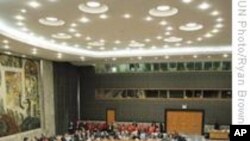A divided U.N. Security Council will meet next week at the request of Arab countries to discuss a U.N. report on war crimes committed by both Palestinian militants and Israel's army during last December's conflict in the Gaza Strip.
The Security Council's monthly meeting on the Middle East was scheduled for October 20, but after a request from council member Libya that some western diplomat's characterized as a bit of a "surprise", the 15-member body agreed in closed consultations Wednesday to move up its session to October 14.
A scheduling change is not usually significant, but this one comes just days after the Human Rights Council, the U.N. organ that commissioned document, called the Goldstone Report, decided Friday to postpone action on the report until March 2010. Some analysts said that was intended to give time for peace talks to be relaunched.
But in the West Bank and Gaza the postponement created an uproar, with days of angry protests and some questioning the leadership of President Mahmoud Abbas. Some diplomats in New York speculated that those events were at least partly responsible for the Arab call to quickly put the report before the Security Council for debate.
The report, released last month by an independent international fact-finding mission headed by South African jurist Richard Goldstone, accused Israel's military and Palestinian armed groups of committing war crimes during Israel's three-week long offensive against Hamas militants in Gaza that began December 27. More than 1,300 Palestinians and 13 Israelis were killed in the conflict.
But the division in the council over the report is clear. U.S. Deputy Ambassador Alejandro Wolff told reporters that the Goldstone report is not the focus of next week's meeting. "This issue is not before the Security Council. We have advanced the monthly debate on the Middle East from October 20th to October 14th," he said.
Wolff reiterated the United States' position on the commission's mandate, calling it "flawed, one-sided," and "unacceptable" and added that the right venue for the report to be discussed is at the Human Rights Council in Geneva.
But Arab ambassadors said they would make the report the focus of the debate and would call their supporters from Arab nations and the Non-Aligned Movement to attend the session. Palestinian Authority Foreign Minister Riyad Al-Maliki is also expected to attend.




